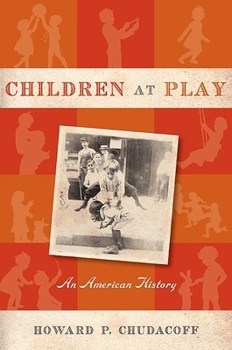Children at Play: An American History
Select Format
Select Condition 
Book Overview
A chronological history of children's playtime over the last 200 years
If you believe the experts, "child's play"; is serious business. From sociologists to psychologists and from anthropologists to social critics, writers have produced mountains of books about the meaning and importance of play. But what do we know about how children actually play, especially American children of the last two centuries? In this fascinating and enlightening book, Howard Chudacoff presents a history of children's play in the United States and ponders what it tells us about ourselves. Through expert investigation in primary sources-including dozens of children's diaries, hundreds of autobiographical recollections of adults, and a wealth of child--rearing manuals--along with wide--ranging reading of the work of educators, journalists, market researchers, and scholars-Chudacoff digs into the "underground" of play. He contrasts the activities that genuinely occupied children's time with what adults thought children should be doing. Filled with intriguing stories and revelatory insights, Children at Play provides a chronological history of play in the U.S. from the point of view of children themselves. Focusing on youngsters between the ages of about six and twelve, this is history "from the bottom up." It highlights the transformations of play that have occurred over the last 200 years, paying attention not only to the activities of the cultural elite but to those of working-class men and women, to slaves, and to Native Americans. In addition, the author considers the findings, observations, and theories of numerous social scientists along with those of fellow historians. Chudacoff concludes that children's ability to play independently has attenuated over time and that in our modern era this diminution has frequently had unfortunate consequences. By examining the activities of young people whom marketers today call "tweens," he provides fresh historical depth to current discussions about topics like childhood obesity, delinquency, learning disability, and the many ways that children spend their time when adults aren't looking.Format:Hardcover
Language:English
ISBN:0814716644
ISBN13:9780814716649
Release Date:August 2007
Publisher:New York University Press
Length:269 Pages
Weight:1.20 lbs.
Dimensions:0.9" x 6.3" x 9.2"
Customer Reviews
3 ratings
A Great Mom Read
Published by Thriftbooks.com User , 17 years ago
As a new mom I have so little time to read. A friend had told me that this was one to make time for, and she was right. Enjoyable, interesting and it made me feel slightly smarter - since all I seem to be reading these days is the back of Cheerios boxes. I recommend this book to anyone who wants to read a very well written book by a historian who writes from a unique perspective. I hope you enjoy it as much as I have!
For historians but also parents and grandparents
Published by Thriftbooks.com User , 17 years ago
Done with the skill of a fine historian there is much here for parents and grandparents. I am particularly impressed with his conclusions. WHAT are we buying our young people and HOW are we programming them in the 21st century ? Whatever happened to play with imagination and to leisure time without stress? We have much to learn from the early days so well chronicled by Dr. Chudacoff. I suggest all those who fight lines at Xmas for the latest electronic gadget or dialup a list of playdates for the little ones ...be wise read and reflect on this book first. Written by Fran FF...a retired guidance counselor
Well-researched depiction of the culture of childhood restores faith in the resilience of children
Published by Thriftbooks.com User , 17 years ago
Howard Chudacoff's Children at Play: An American History explores the changing nature of childhood in American since the 1600s. The whole notion of childhood as an historical and cultural phenomenon is, in itself, revelatory. Reading Children at Play is to see American children as something like a separate country, with its own government, its own history, its own customs, its own borders. In a large part, the history of American childhood proves to be a story of borders being constantly redrawn, redefined, reinterpreted. Chudacoff's well-documented and compassionate study shows how children, poor and wealthy, slave and privileged, native and immigrant, surrounded on all sides by adult America, endowed with childlike resilience and endless capacity for passion, have managed to resist hundreds of years of concerted adult efforts to subvert childhood into something other, something safe, predictable and under control. Children at Play is in many ways a romance. As the book nears its conclusion, and we read about the evermore massive attempts to co-opt children's play, we find our very adult selves hoping against hope that children will once again reclaim their inalienable rights, breaking the shackles of rampant commercialism and overprotective parents so they can once again take up their "quest for independence." Here, from the end of the chapter "1950 to the Present," Chudacoff gifts us with a ray of hope: "...while media critics and child advocates have fretted about the hypnotic, sedentary quality that television has inflicted on children, there is always the possibility that kids can convert an object as mundane as a TV box into ther own plaything." He goes on to quote a story told by Isabel Alverez. "See, those old television sets used to have the cardboard [backs] with holes in them. The television was on and we could see all of the lights in the back...So we took the cardboard off and put our dolls in there and played that it was the city of Manhattan." Chudacoff concludes: "Kids still find ways to be kids." Bernie DeKoven, author, Junkyard Sports, The Well-Played Game






